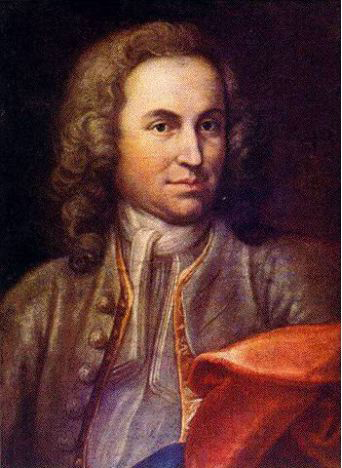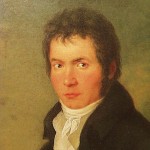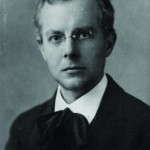
Johann Sebastian Bach
In Western concert music history they usually speak of the Three B’s: Bach, Beethoven and Brahms. Originally, these famous three b’s were coined by the German composer and writer Peter Cornelius (1824-1874) in 1854, but instead of Brahms, Cornelius had placed the French composer Hector Berlioz (1803-1869) on the list. Some years later, the famous German orchestra conductor Hans von Bülow (1830-1894) wrote Berlioz off the list and added Mr Brahms… And so Johann Sebastian Bach (1685-1750), Ludwig van Beethoven (1770-1827) and Johaness Brahms (1833-1897) remained indissolubly united in the history of western music as the Holy Trinity. There is no doubt that Robert Schumann’s (1810-1856) words dedicated to Brahms as the “true successor of Beethoven” had a lot to do in adding Brahms to that list.

- Ludwig van Beethoven
This list of the three had quite an obvious German tinge. The three composers were born in a German cultural environment. Bach was born in Eisenach and developed all of his career between Thuringia and Saxony, that is, in the centre of present Germany; Beethoven was born in Bonn, but he developed most of his career in Viena (back then the capital of the Austro-Hungarian Empire); Brahms was born in Hamburg and, like Beethoven, he developed his career in Viena. None of them were contemporaries: Beethoven was born twenty years after Bach’s death; Brahms six years after Beethoven’s death. However, Beethoven was deeply influenced by Bach (specially his late works); Brahms was influenced by Bach and Beethoven.
 These Three B’s have dominated musical history from the second half of the 19th century almost up to our days. I dare to say the Three B’s are no more than a symptom of musical culture centered in Germany and Austria. However, the rules of the game changed as the 19th century came to an end and over the 20th century. Music was decentralized… And that is why I speak of “The Five B’s”: Bach, Beethoven, Brahms, Bartók & Britten.
These Three B’s have dominated musical history from the second half of the 19th century almost up to our days. I dare to say the Three B’s are no more than a symptom of musical culture centered in Germany and Austria. However, the rules of the game changed as the 19th century came to an end and over the 20th century. Music was decentralized… And that is why I speak of “The Five B’s”: Bach, Beethoven, Brahms, Bartók & Britten.

- Béla Bartók
The Hungarian composer Béla Bartók (1881-1945) was born while Brahms was still alive. Bartók’s early works are clearly influenced by Brahms, although he later developed a peculiar and unique muscial language which makes his music hard to categorize. Bartók was a witness of the crumbling of the Austro-Hungarian Empire —he was born in the Austra-Hungary of the time; presently, the town Bartók was born and other towns he lived in do not belong to Hungary but to Romania and Slovenia, for example— and of two World Wars during the 20th century.

- Benjamin Britten
The British Benjamin Britten (1913-1976) was born 32 years after Bartok. So, they shared their steps on this planet Earth for about 30 years. Like Bartók, Britten developed a unique musical language. People who have hardly listened to their music, they might find more things in common between Bartók and Britten than between them both and the three preceding German composers. Not in vain, Bartók and Britten composed their works during the 20th century and, definitely, this is something that binds them together. Both composers drink from the same sources of Bach, Beethoven and Brahms. But they both create a distinctive musical language as well, quite different from that of the three Germans.
So, the five b’s (Bach, Beethoven, Brahms, Bartók & Britten) is a list that may include some other musicians in the future. The poor Mr Hector Berlioz fell off the list over 150 years ago and I have not included him in this one either. I consider these are the b’s, and no others, the ones which deserve to be together. The music history yet to come will no longer be exclusively German, not even European. And there may be nobody else willing to speak about the five b’s except for me on this page.
Recommended Works:
Bach – Brandenburg Concertos
Beethoven – 9th Symphony
Brahms – Piano concerto no. 2
Bartók – Concerto for Orchestra
Britten – War Requiem
Michael Thallium
Global & Greatness Coach
Book your coaching here
You can also find me and connect with me on:
Facebook Michael Thallium and Twitter Michael Thallium
